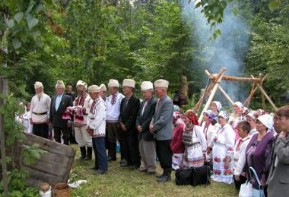 Websites
Websites
|
|
|
|
|
Pagans react to church's accusations
 Pagans across the world have reacted angrily to accusations that they are responsible for a spate of attacks on churches in a Highland town, culminating in an incident in which a dead animal was used to deliver a message. Pagans across the world have reacted angrily to accusations that they are responsible for a spate of attacks on churches in a Highland town, culminating in an incident in which a dead animal was used to deliver a message.
They insist that no-one with their beliefs would be guilty of such behaviour, and that the church was out of line to make the claim.
In a year-long campaign, a series of sinister notes written in pink ink have been left on the front door of Grantown Baptist Church in High Street, Grantown, with the attacks culminating in a dead rabbit being pinned to the door a fortnight ago. Last week it was reported that a church deacon had suggested that the notes were the work of a “bit of a crackpot” and that pagans could be to blame.
The comments have provoked a flurry of comment on chat sites and blogs around the world.
One post by 'Beatrice' states: "It's an ex church member! We have seen this before in the news where disgruntled ex members have attacked their own church. In one case it was the minister burning bibles on the church doorstep."
References were made to the "All-seeing-eye" and masonic symbols.
Reports have carried references to the "All-seeing-eye" and masonic symbols. The former however is not-so-much associated with pagans and references can be found in an earlier report of these events in Grantown on the Christians Together web site.
Regarding the incidents, Northern Constabulary is also investigating reports of notes being left at a second Grantown church, St Columba’s Episcopal, in South West High Street. and anyone with information is invited to contact the police on Tel. 01479 872922
Footnotes:
According to the Pagan Federation's web site a Pagan is defined as: "A follower of a polytheistic or pantheistic nature-worshipping religion."
And Paganism as: "A polytheistic [many gods] or pantheistic [god-in-everthing] nature-worshipping religion."
The site futher informs:
"Paganism encompasses the indigenous belief of a country. So before any human-centric religions developed there were many other spiritual traditions in each country. For example Druids in Celtic countries, Shamans in many countries including Native America and Siberia, Shinto in Japan, Witchcraft and Wicca, Norse Tradition and many other traditions."
Scotland & Ireland contain so many Pagan sites that it would be invidious to name [a small number]. There are many, many standing stones, circles, cairns, cromlechs and other sacred places of our ancestral religions.
The Scottish branch states:
The Pagan Federation (Scotland) is a democratic organisation whose membership is drawn from all the Pagan traditions including Wicca and other forms of Pagan Witchcraft, Druidry, Heathenry, Celtic Paganism, Shamanism and Goddess-Spirituality. It is an autonomous national body within the Pagan Federation, Europe's largest and most active Pagan organisation. Paganism is a spiritual way of life which has its roots in the ancient nature religions of the world. It is principally rooted in the old religions of Europe, though some adherents also find great worth in the indigenous beliefs of other continents.
Some of principlal pagan festivals are centred around the Summer and Winter solstices and the Spring and Autumn equinoxes. |
Christians Together, 12/03/2009
|
|
|
|